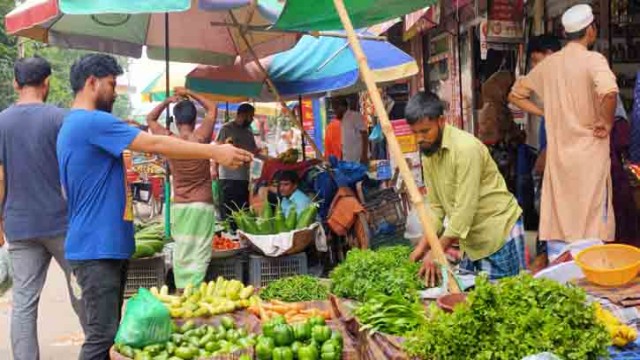Rajshahi, July 7 (V7N) - Vegetable prices in Rajshahi have increased over the past week due to continuous rainfall disrupting supply chains. The rise in prices has also affected poultry, eggs, and fish, while rice prices remain stable at an elevated level.
A survey of markets in Rajshahi city and its outskirts reveals that prolonged monsoon showers have limited vegetable supply, pushing prices up. As of Friday, potatoes were selling at Tk 22–25 per kg, eggplants at Tk 60–70, pointed gourd (potol) at Tk 30, okra (dherosh) at Tk 30, cucumber at Tk 40, sweet pumpkin at Tk 30, bottle gourd at Tk 25–30 per piece, ash gourd at Tk 30, and green chilies at Tk 100–120 per kg. Onions were selling for Tk 45–50.
In addition to vegetables, fish prices have increased further, also attributed to supply disruptions. Beef prices rose from Tk 700 to Tk 750 per kg, and mutton climbed from Tk 900 to Tk 1,100. Small fish varieties were selling at Tk 300–400 per kg, silver carp at Tk 160–180, pangas at Tk 180–240, and rui-katla at Tk 380–430.
Poultry prices also surged. Broiler chicken sold at Tk 150–170 per kg, sonali chicken at Tk 280–300, and indigenous (deshi) chicken at Tk 450–500. Egg prices rose modestly, with white eggs selling at Tk 36–38 per dozen and brown eggs at Tk 40–42.
A visit to rice wholesale depots in Kumarpara showed that prices remained high but stable. Wholesale prices included Guti Swarna at Tk 50 per kg, Parija/Red Swarna at Tk 58–60, new Atash at Tk 70, old Atash at Tk 75, new Miniket at Tk 80, old Miniket at Tk 85, and Nazir Shail at Tk 90.
In the retail market, rice vendors in Shaheb Bazaar reported selling Guti Swarna at Tk 52, Parija/Red Swarna at Tk 60–62, new Atash at Tk 72, old Atash at Tk 77, new Miniket at Tk 82, old Miniket at Tk 87, and Nazir Shail at Tk 90–92 per kg.
Traders say that unless weather conditions improve, prices are unlikely to fall soon. Consumers, particularly those from low-income groups, are expressing concern about the growing pressure on household budgets as monsoon effects continue to disrupt local food supply.
END/MRA/SMA/































Comment: